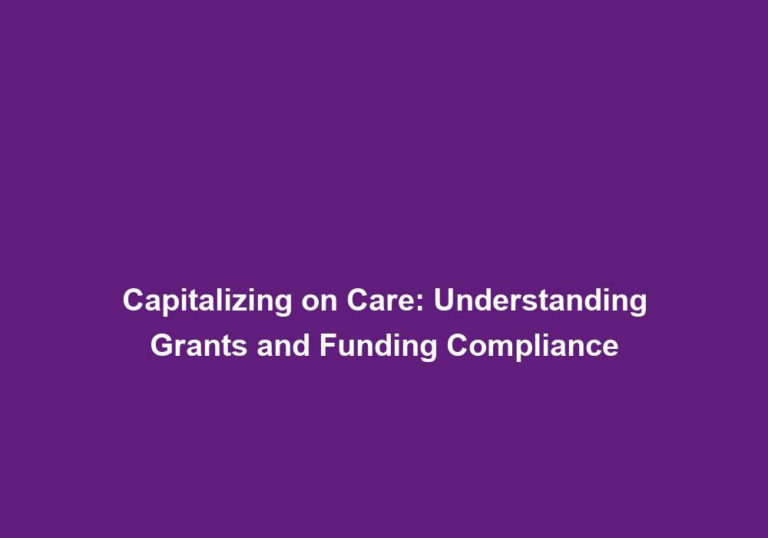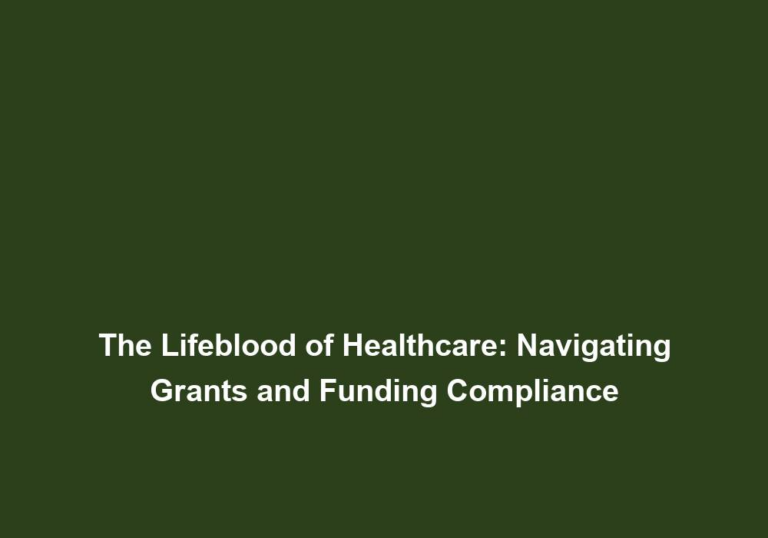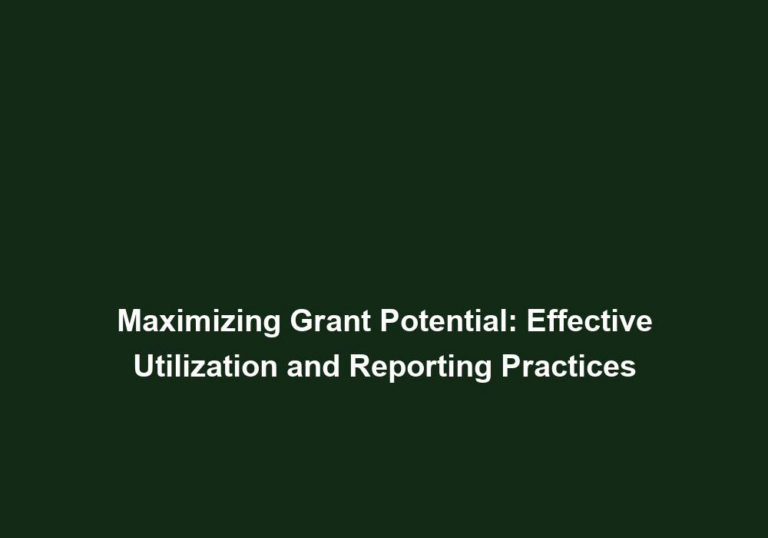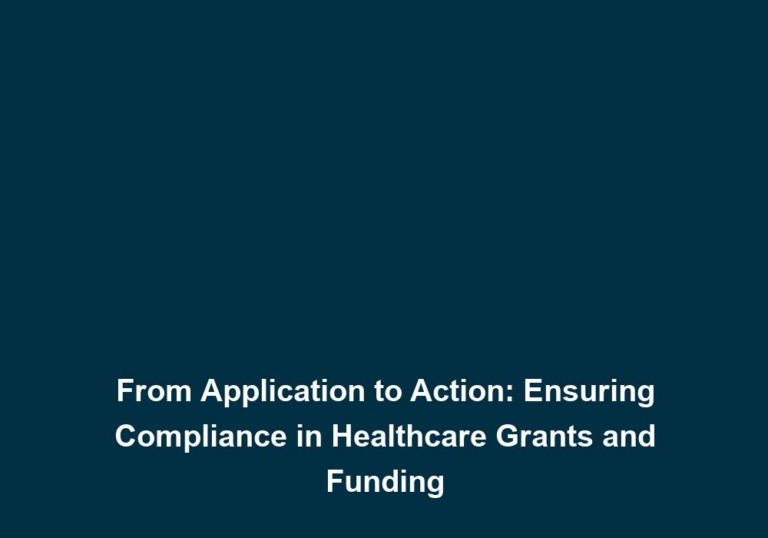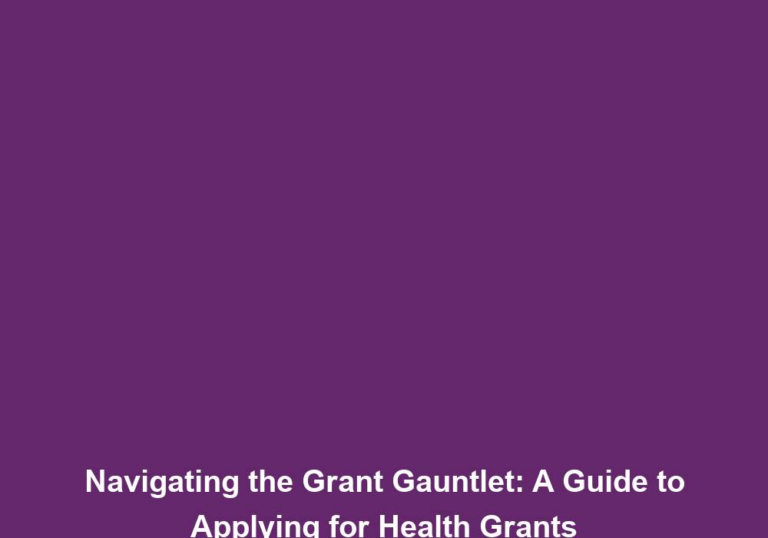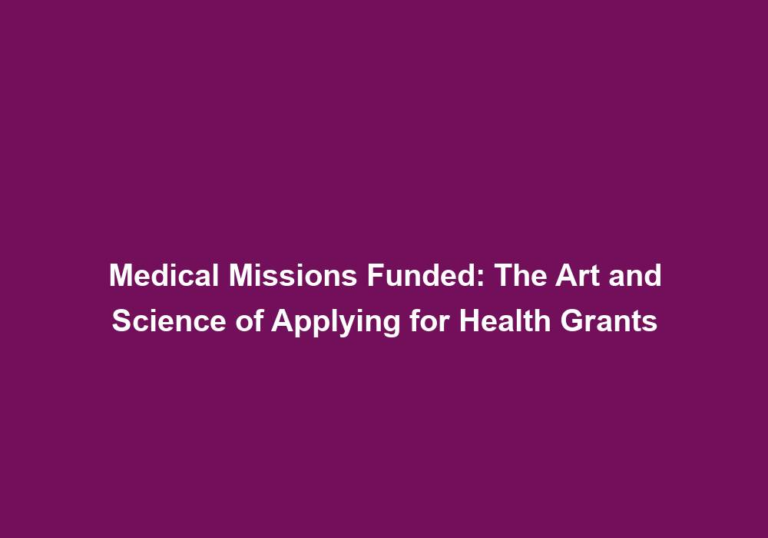Sourcing Success: Best Practices for Applying for Health Grants
In today’s highly competitive world, securing funding for healthcare projects and initiatives can be a challenging task. However, with the right approach and knowledge of best practices, you can significantly increase your chances of success. In this article, we will explore effective strategies for applying for health grants, helping you navigate the process and maximize your chances of securing the funding you need.
Understanding the Grant Landscape
Before diving into the application process, it is crucial to have a comprehensive understanding of the grant landscape for healthcare projects. Here are some key points to consider:
- Research: Begin by conducting thorough research to identify potential grant opportunities. Look for organizations, foundations, and government agencies that offer health-related grants. Explore their websites, review their eligibility criteria, and assess whether your project aligns with their funding priorities.
-
Look for grants that specifically target the type of healthcare project you are planning. This will increase your chances of finding the right fit for your project.
-
Consider the size of the grant. Some grants may offer larger funding opportunities, while others may provide smaller grants that are more suitable for specific initiatives.
-
Pay attention to the application deadlines. Make sure you have enough time to prepare and submit your application before the deadline.
- Narrow Down Your Options: Once you have identified a list of potential grant providers, carefully review each opportunity and assess their suitability. Consider factors such as the grant amount, application requirements, reporting obligations, and the likelihood of success. Prioritize the grants that align most closely with your project’s goals and requirements.
-
Assess the eligibility criteria for each grant opportunity. Make sure you meet all the requirements before investing time and effort in the application process.
-
Consider the reporting obligations associated with each grant. Some grants may require regular progress reports, financial statements, or other documentation to ensure accountability.
-
Evaluate the likelihood of success for each grant opportunity. Review past awardees and their projects to gauge the grant provider’s preferences and priorities.
- Network and Seek Guidance: Engage with industry professionals, healthcare organizations, and individuals who have successfully secured grants in the past. Their insights and experiences can provide valuable guidance and help you refine your grant application strategy.
-
Attend conferences, seminars, and networking events related to healthcare funding. This will give you the opportunity to connect with experts and learn from their experiences.
-
Join online forums or communities focused on healthcare grants. Participate in discussions and ask for advice or recommendations from experienced grant recipients.
-
Reach out to mentors or advisors who have expertise in grant writing or healthcare project management. They can provide valuable feedback and guidance throughout the application process.
Crafting a Compelling Proposal
A well-crafted grant proposal is essential to capturing the attention of the grant provider and convincing them to fund your project. Here’s how you can make your proposal stand out:
- Start with a Clear Introduction: Begin your proposal with a concise and compelling introduction that highlights the significance of your healthcare project. Clearly state the problem or need your project aims to address and emphasize its potential impact on the community or target population.
-
Provide background information to help the grant provider understand the context and importance of your project. Explain why addressing the identified problem is crucial for the target population or the healthcare system as a whole.
-
Use statistics, case studies, or real-life examples to showcase the urgency and relevance of your project. This will help create a sense of importance and demonstrate the need for funding.
-
Clearly articulate your project’s goals and objectives in the introduction, giving the grant provider a clear understanding of what you aim to achieve.
- Provide a Detailed Project Description: Elaborate on the objectives, scope, and methods of your project. Clearly outline the activities you plan to undertake, the expected outcomes, and the timeline for implementation. Use data and evidence to support your claims and demonstrate the feasibility and effectiveness of your approach.
-
Break down your project into specific components or phases, providing a detailed description of each. This will help the grant provider understand the complexity and thoroughness of your proposed project.
-
Describe the strategies and methodologies you will employ to achieve your project goals. Explain how these strategies have been proven effective in similar projects or situations.
-
Use relevant data and evidence to support the need for your project and the potential impact it can have. This could include research studies, surveys, or expert opinions.
- Highlight Organizational Capacity: Grant providers want to ensure that funds are allocated to organizations with the capacity to execute the proposed project successfully. Showcase your organization’s track record, expertise, and relevant partnerships to instill confidence in the grant provider.
-
Provide an overview of your organization’s history, mission, and previous accomplishments in the healthcare field. Highlight any successful projects or initiatives that demonstrate your ability to deliver results.
-
Emphasize the qualifications and expertise of your team members who will be involved in the project. Highlight their relevant experience, certifications, or specialized skills.
-
If applicable, showcase any partnerships or collaborations you have established with other organizations or healthcare professionals. This demonstrates your ability to leverage resources and expertise to enhance project outcomes.
- Develop a Realistic Budget: Carefully outline the budget for your project, ensuring that it is realistic, well-documented, and justifiable. Clearly indicate how the grant funds will be utilized and how they align with the project’s goals and objectives. Be transparent about any co-funding or in-kind support you have secured or plan to secure.
-
Break down the budget into specific categories, such as personnel costs, equipment or supplies, training and development, and evaluation expenses. This provides clarity and transparency regarding how the funds will be allocated.
-
Justify the budget by explaining how each expense contributes to the success of the project. Demonstrate that the requested grant amount is necessary and reasonable based on the scope and objectives of the project.
-
If you have secured or plan to secure additional funding from other sources, clearly indicate this in the budget. This demonstrates your commitment to securing the necessary resources for the project’s implementation.
- Detail your Evaluation Plan: Grant providers are interested in understanding how you plan to measure the success and impact of your project. Develop a robust evaluation plan that includes clear indicators, data collection methods, and analysis techniques. Highlight how the results will be used to inform future improvements and sustainability.
-
Identify specific indicators or metrics that will be used to measure the success of your project. These could include healthcare outcomes, patient satisfaction rates, or cost-effectiveness measures.
-
Describe the data collection methods you will use to gather relevant information for evaluation. This could include surveys, interviews, observation, or analysis of existing data sources.
-
Explain how you will analyze and interpret the data collected to draw meaningful conclusions about the project’s impact. Highlight any statistical or analytical techniques that will be employed.
- Proofread and Edit: Ensure that your proposal is error-free, well-structured, and professionally presented. Proofread diligently to eliminate grammatical errors, typos, and inconsistencies. Consider seeking feedback from peers or professionals to ensure clarity and effectiveness.
-
Read through your proposal multiple times to catch any errors or inconsistencies. Pay attention to grammar, spelling, punctuation, and sentence structure.
-
Make sure the proposal is well-organized and follows a logical flow. Use headings, subheadings, and bullet points to enhance readability and facilitate understanding.
-
Consider sharing your proposal with colleagues, mentors, or professional grant writers for feedback. Their fresh perspective can help identify areas for improvement and strengthen your proposal.
Navigating the Application Process
The application process for health grants often involves several stages and requirements. Here are some essential tips to navigate this process successfully:
- Follow Instructions: Carefully read and understand all the instructions provided by the grant provider. Ensure that you meet all the eligibility criteria and comply with the formatting, submission, and deadline requirements. Failure to do so may result in disqualification.
-
Create a checklist or document to keep track of all the requirements and deadlines for each grant application. This will help you stay organized and ensure you don’t miss any important details.
-
Pay attention to the formatting guidelines provided by the grant provider. Use the recommended font, font size, margins, and spacing to ensure your application looks professional.
- Prepare Supporting Documents: Gather all the necessary supporting documents, such as financial statements, organizational profiles, resumes, and letters of support. Ensure that these documents are up-to-date, accurate, and relevant to your project.
-
Review each grant application’s requirements carefully to identify the supporting documents that need to be submitted. Prepare these documents well in advance to avoid last-minute scrambling.
-
Double-check the accuracy and completeness of each document. Ensure that all financial statements or other supporting evidence are current and reflect the most recent information.
- Engage with the Grant Provider: If the grant provider offers pre-application meetings or consultations, take advantage of these opportunities. Engaging with the grant provider allows you to seek clarifications, understand their priorities, and establish a rapport, potentially increasing your chances of success.
-
Reach out to the grant provider if you have any questions or need clarification about the application process or requirements. They are usually willing to provide guidance and support to potential applicants.
-
Attend any information sessions or webinars offered by the grant provider. These sessions often provide valuable insights into what the grant provider is looking for in successful applications.
- Submit Early: Avoid waiting until the last minute to submit your application. Technical glitches, unforeseen circumstances, or an overwhelming number of last-minute submissions can jeopardize your chances. Submitting early also demonstrates your commitment and professionalism.
-
Set a deadline for yourself that is well in advance of the actual submission deadline. This allows you enough time to review and revise your application before final submission.
-
Submit your application a few days before the official deadline to account for any unexpected issues that may arise. This will give you peace of mind and ensure that your application is received on time.
- Prepare for Rejection: Grant applications are highly competitive, and rejection is a possibility. If your application is not successful, seek feedback from the grant provider to understand areas for improvement. Use this feedback to refine your proposal and apply for other opportunities.
-
Reach out to the grant provider and request feedback on your application. Understand the specific reasons why your application was not successful and use this information to strengthen future applications.
-
Take the rejection as a learning opportunity and an opportunity to improve your proposal. Analyze the feedback received and make the necessary adjustments to increase your chances of success in future applications.
Continuous Improvement and Learning
Even if you are successful in securing a grant, the learning process does not end there. To maximize the impact of your project and increase your chances of securing future funding, consider the following:
- Regular Evaluation and Reporting: Continuously monitor and evaluate the progress of your project, collect data, and measure outcomes against your proposed indicators. Regularly report your findings to the grant provider, ensuring transparency and accountability.
-
Establish a system for ongoing data collection and evaluation throughout the project implementation. This will help you track progress, identify areas for improvement, and demonstrate the impact of your project.
-
Develop comprehensive reports that summarize the findings, challenges, and successes of your project. Submit these reports to the grant provider according to the agreed-upon schedule or reporting requirements.
- Engage in Knowledge Sharing: Share your project’s successes, challenges, and lessons learned with the wider healthcare community. Present your findings at conferences, publish articles in relevant journals, or participate in webinars to contribute to the collective knowledge and inspire others.
-
Identify relevant conferences, seminars, or webinars where you can present your project’s findings or lessons learned. This will help you connect with other healthcare professionals and expand your network.
-
Consider publishing articles or white papers in reputable journals or online platforms. This will help disseminate your project’s results and contribute to the existing body of knowledge in the healthcare field.
- Seek Collaboration Opportunities: Explore opportunities to collaborate with other organizations, both within and outside your sector. Collaboration can not only enhance the impact and sustainability of your projects but also increase your access to funding and resources.
-
Research potential partners or organizations that share similar goals or objectives. Reach out to them to explore collaboration opportunities and discuss potential joint projects.
-
Consider forming partnerships or consortiums for larger-scale projects that require a broader range of expertise or resources. Collaborative efforts often have a higher chance of securing funding and achieving greater impact.
- Stay Informed: Continuously stay updated on new grant opportunities, trends, and best practices in the healthcare field. Attend seminars, workshops, and webinars to expand your knowledge and network with potential funders and collaborators.
- Subscribe to relevant newsletters, mailing lists, or


